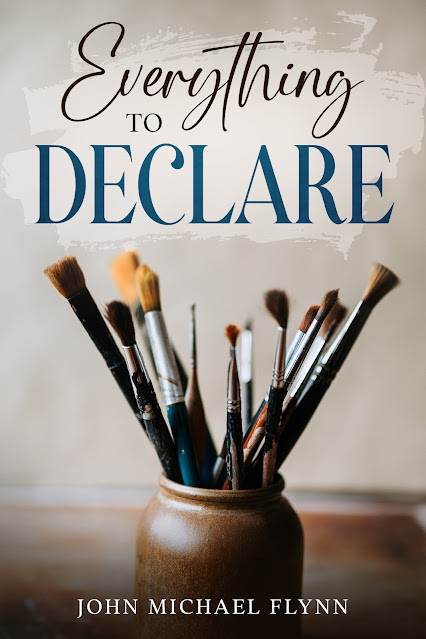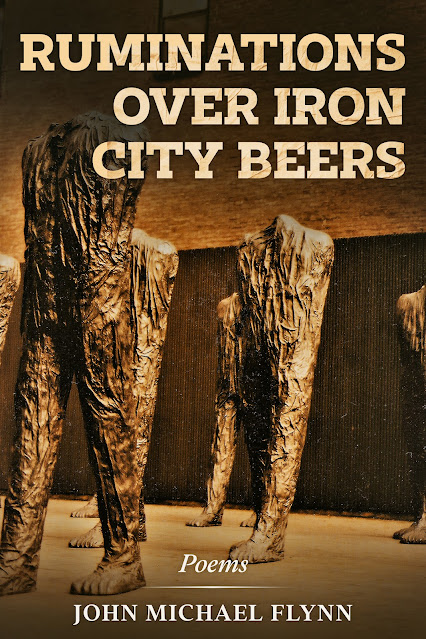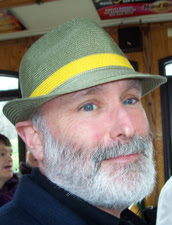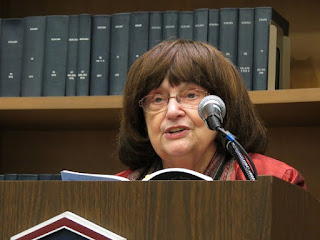GEORGE GARRETT
I can't share enough compliments regarding George Garrett. Not only was he a fine, prolific author of historical novels, of realist Southern fiction, of short stories and essays, he was, based on my experiences, one of the kindest and most supportive professional men I've had the pleasure to meet.
In 1983, on a barnstorming tour to promote the second novel in his Elizabethan trilogy, The Succession, he came to what was then Roger Williams College to read and to meet with students in the English department there. Before coming, encouraged by my professor at RWC, Geoffrey Clark, I mailed George a short excerpt from a novel I was working on hoping that he might read it and that, upon his arrival to campus, we might discuss it.
To be honest, I didn't have high hopes or expectations, but George did not disappoint. He had not only read my pages, but he took the time to sit with me for an hour, in private, and to talk about what I was trying to do, and what worked in my prose, what its strengths were, its distinguishing features, its natural ebbs and flows, and what didn't, namely where I was forcing the issue and, in his mind, sounded like whomever I happened to be reading at that time.
George was honest, direct, but enthusiastic and supportive and generous to the extent that I was able to relax with him and ask whether I was wasting my time trying to write and, frankly, did I have any talent at all? I was, I think, 23 years old and unsure about my future and slated to graduate with a BA in English that spring.
Instead of answering my questions in any kind of banal or predictable way, George again referred to the prose sample I'd sent him, isolating sentences and a few paragraphs where he thought I showed considerable promise and a sense of what he called "texture" in my writing.
He told me I should keep writing, that it was a long road ahead of me, that I should read more, too, but if I wrote every day, and revised my work assiduously, I could possibly create something that was decent. He wisely avoided all talk of publishing and achieving notoriety.
I had read George's short novel, The Magic Striptease, and his novel, The Finished Man, his short story The Old Army Game, many of his poems, and the first novel in his Elizabethen trilogy, Death Of The Fox, about Sir Walter Raleigh.
I admired the way he told Raleigh's story through the use of a non-linear narrative, shifting points of view, internal monologues and dialogues that allowed the story to unfold in unexpected ways, showing the personal, emotional sides of the characters involved while all the time keeping to historical relevancy and facts. He was able to stir in me a passion for, and a better understanding of the era, of Raleigh the man, of the challenges he and those of his time had faced.
I remember while reading the novel, I kept thinking to myself that I wanted to write in a similar fashion, not to copy George, but to discover ways of examing a character's inner life through the use of such accessible yet lucid and descriptive prose. What I took away from my reading, and from my conversation with George was the importance of voice in narrative, and fearlessness in the author.
Meeting with George helped me to feel more confidence. Perhaps I was, indeed, capable of writing a first novel if I was willing and able to put in the work. I think many students and aspring authors who mentored under George saw a quality in him, a light, a smile, an unselfishness and an uncanny ability to inspire.
What I'll always remember about George is that not only was he an excellent writer, but he was a good and kind and generous man. Because of this, he was beloved by all who got to know him.
Later that year, during the month before I would surprise myself by graduating Summa Cum Laude from Roger Williams, I learned that I had received a full scholarship to study for a Master's at the University of Michigan. After meeting with George, I had written to him, learning that he had helped launched a new MFA program there, a graduate level diploma which would blend writing critically with creative writing. I was over the moon.
George hadn't answered my correspondence with a personal letter. What I received in the mail was everything I would need to apply to the program. I did so and was accepted with a full scholarship and a teaching assistanship one of twelve students accepted into that second year of the program.
Here is a blog post from 2011 titled "George Garrett: Mentor To A Thousand Writers Like Me." I think it shows quite clearly how powerful an inspiration George was to so many. https://writingasaprofession.wordpress.com/2011/12/20/george-garrett-mentor-to-a-thousand-writers-like-me/
I wish I could say that I studied with George at Michigan, but after driving out there from New England that summer, I walked into the office of Dr. Enoch Brater, who was heading the English Department at that time, and learned in a rather unceremonious way from his secretary that George had left Ann Arbor to accept an endowed chair at the University of Virginia, where he remained until his retirement nearly twenty years later.
George had taught there earlier in his career, back in the sixties. I believe it was the Henry Hoyns Chair that he was offered, and though I despaired a while that he wouldn't be there in Ann Arbor, and more than once considered chucking it all and leaving Michigan, I couldn't blame George for returning back to his native South and for accepting such a presitigious position.
I kept following his career, however, reading his work, and learning how not to write. I began to understand how privileged I was to be in the company of so many fine professors at the University of Michigan. I remember well working as a TA for Dr. Hugh English and soaking up his lectures on Chaucer, and with Dr. Jesse M. Gellrich who allowed me to create lessons for his class in how to write an essay's opening and conclusion. This was the first real teaching I'd ever done, and Dr. Gellrich gave me the floor and let me learn by doing.
I did my best to focus on the kind of literary studies I wanted to pursue, but I saw that the mid-century approaches that centered mostly on language and metaphor were being replaced by an insistence on Marxism, feminism and multi-cultralism.
I remember speaking about this to Dr. Robert H. Super, who wrote about and edited many collections of one of my favorite poets, Matthew Arnold, and his books are still relevant, readable and available today. https://www.goodreads.com/author/list/155950.R_H_Super
I stood there with Dr. Super, and the writer Janet Kauffman in what had been his office when he was cleaning it out, rather morosely, to allow Janet to take his place as part of the long slow process of his retirement.
Everything was changing, and for me it had started with George not being there. Yet I also remember how much my girlfriend enjoyed her classes on contemporary fiction taught by critic and essayist and then director of the Hopwood Program, John W. Aldridge, who had just published The American Novel And The Way We Live Now.
They each provided inspiration, filling in for George, so to speak, and I rather slowly began to accept that I if I was going to write, to earn a living, I couldn't let any changes or disappointments stop me.
In retrospect, I have my girlfriend at that time to thank for she more than once talked me out of quitting and abandoning my scholarship. She told me to wake up and to focus on what I loved, and to remember it was only two years and they'd pass quickly, especially if I kept busy.
I continued to read George's work, to follow his career, and I wrote him letters now and then. I had the privilege of hearing him lecture one summer, I think in 1985, again thanks to my girlfriend, at Bennington College. It was there I had the good fortune of sitting in on some workshops, meeting a handful of authors, most memorably Al Young, and Jon Manchip White.
I also attended a lecture given by Saul Bellow, who was in his prime. On another night, I got to hear a young author with links to Antigua named Jamaica Kincaid read from her first book and to a large audience for what was allegedly the first time.
This was rarified air I was breathing, and I had George to thank for it.
The following year, George returned to Ann Arbor for two days as a guest author, and he gave a few lectures and promoted An Evening Performance, a new selection of his short stories.
I remember George talked about writing descriptions and recommended Vladimir Nabokov, particularly his novel Lolita, and Noabokov's use of simplicity in his descriptions rather than ornate modifiers. George believed that simplicity allowed readers to absorb the essence of a particular aroma or sound, and to fill in the details from their own imaginations. The writer shouldn't be too intrusive and didn't need to do all the work.
He spoke about F. Scott Fitzgerald and the painful irony that as Fitzgerald improved as a writer, and for this George cited specific passages from Tender Is The Night, his reputation as a writer, a man, and as a drunkard contributed to his increasing lack of popularity.
George contrasted Fitzgerald's arc with that of Thomas Wolfe's, who as he got more tiresome, verbose and opaque as a writer, became more popular. George spoke of these novelists not as a critic, per se, but as one who'd read them as a writer himself, respecting and appreciating their work and able to see the flaws as well as the genius in it.
Strangely enough, many years later in the late winter of 2008, my wife and I moved to Charlottesville, though for reasons unrelated to the University of Virginia and to the fact that George was living there.
We had arrived and my wife had started her new job within just a few months before George died. I didn't attend his funeral, I couldn't due to being laid up with a ruptured Achille's tendon, but I read with great interest what was published about him in the local newspapers there, which included a tribute from fellow C-ville resident and author John Grisham.
It was a sad occasion for all who'd been fortunate enough to know him, though judging by what I've read about the three-day festival held in 2003 in his honor at the University of Tennessee, Knoxville, George is still very much beloved.
Here is an obit by the poet Henry Taylor who was George’s student at the University of Virginia between 1962 and 1965.
https://poets.org/poet/henry-taylor
Mr. Taylor's essay on George’s poetry, “The Brutal Rush of Grace,” is collected in Compulsory Figures (LSU Press, 1992). He became a good friend of George's. He's published six collections of poems; his third, The Flying Change, received the 1986 Pulitzer Prize in Poetry. He taught at American University from 1971 to 2003.
Mr. Garrett was vastly learned and multitalented, but no one ever carried such knowledge and such achievements more lightly. In person he combined the thoughtful manners of his Southern upbringing with a restless urge to turn established views one way or another, so the light would strike them in fresh and revealing ways. He had an inexhaustible fund of anecdotes, many of them hilarious, a few so remote from his listeners’ experience that they had a durable sharpness, hanging in the memory and gathering import.
At Princeton, for example, Mr. Garrett continued for a while to develop the skill he had acquired as a Golden Gloves boxer, and in the gym he encountered such people as do not often come your way or mine. Among these was a custodial worker who had himself done some boxing, and who enjoyed making a wager with the “boys.” The worker would remove a handkerchief from his pocket, bend over, and lay it out flat just in front of his toes, and place both feet side by side upon it. He then would make an extravagant wager against anyone who would care to try knocking him off the handkerchief with a blow above the shoulders. His own hands, he added, would stay behind his back.
Even as his reputation grew, some undergraduate could usually be found to take the bet and start throwing what passed for punches. The man on the handkerchief put on a magical display of rapid head movement, rarely shifting his upper body. The boys might lightly graze a cheekbone once in a while, but they never could really hit him. It was like watching a film with frames clipped out of it, the head being first here and then instantaneously there.
The student paid up, and work resumed. Decades later those unusual images bring to mind devotion to the study of a peculiar skill, pursuit of an endeavor for the joy in the thing itself, and the gravy that is the occasional discovery of a way to be paid for it. When Mr. Garrett told that story, one could see the imagined handkerchief being shaken out, and the precision of the two little steps forward onto it, but his own handkerchief stayed safe in a jacket pocket. He had his boisterousness, but there were limits.
He was born George Palmer Garrett Jr. in central Florida on June 11, 1929. His father was a small-town lawyer of unusual energy and great courage, in some ways the inspiration for Mr. Garrett’s first novel, The Finished Man, and the title story of his first collection, King of the Mountain. Many years later, in Bad Man Blues, Mr. Garrett published a couple of nonfiction pieces about his father’s stern and risky stance against the Ku Klux Klan.
He attended the Sewanee Military Academy and the Hill School and entered Princeton in the late 1940s, receiving his bachelor’s degree in 1952. There followed a tour of duty in the Army active reserves after which he returned to Princeton, where he completed his master’s degree in 1956. By then he was married to Susan Jackson Garrett, “without whom,” he wrote in a dedication, “there would be nothing.” Having done work toward the Ph.D., but having also published fiction and poetry, he left Princeton for appointments at Wesleyan and Rice, and then the University of Virginia, where he started teaching in 1962. He resigned from the University of Virginia in 1967; he returned in 1984 and retired in 2000 as Henry Hoyns Professor of Creative Writing. In the years between, he held visiting and full-time appointments at several universities, including Princeton.
Shortly after his return to Virginia, a group of emeritus professors at Princeton took renewed notice of the first two books in Mr. Garrett’s superb Elizabethan trilogy, Death of the Fox (1971) and The Succession (1983). (The third novel in the series, Entered from the Sun, was not published until 1990.) Mr. Garrett had begun research on Sir Walter Ralegh, the protagonist of the first of these novels, as a doctoral candidate. Might these two books now be regarded as his completed dissertation? The English department was so persuaded, with the understanding that Mr. Garrett would return to Princeton for a public defense of his dissertation. He received his Ph.D. in 1986.
By then he had behind him almost 40 years of distinguished and inventive teaching, characterized by a mind constantly alert to fresh possibilities, a keen eye for deserving objects of satire, and a kindly generosity toward his students, large numbers of whom are now reporting to memorial Web sites and publications their various deep indebtednesses to him. It has been said that no other living writer had so many books dedicated to him; that is hard to prove but easy to believe.
The Elizabethan trilogy, the series of story collections culminating but not ending with An Evening Performance: New and Selected Short Stories (1985), and the several other novels of staggering variety have led many readers to think of Mr. Garrett primarily as a fiction writer. However, he was also a poet of rare productivity, freshness, and power. By 1963, when he was 34, he had published three books of poems, and he was included in a special issue of the Princeton University Library Chronicle entitled “Seven Princeton Poets.” This elegant anthology represents each poet with one poem, a critical essay about his work, and a checklist of his published work to that time. The poets are Louis Coxe ’40, George Garrett, Theodore Holmes ’51, Galway Kinnell ’48, William Meredith ’43, W. S. Merwin ’48, and Bink Noll ’48. Mr. Garrett’s poem is “Salome,” a monologue spoken by the character. It remains among the strongest poems of Mr. Garrett’s career.
In a series of bold moves so casually executed that their boldness takes time to sink in, Mr. Garrett presents Salome first as the legendary figure partly descended from the brief mentions in the Gospels of Matthew and Mark, and then, without departing from the story of the dance and the execution of John the Baptist, as a woman of our time, able to use such words as “chevron.” She begins with a one-line stanza, “I had a dream of purity.” Then,
From weight of flesh and cage of bone,
it was I who was set free
and that other me like a blown weed
was scattered by the wind. …
All my dust was gone for good,
and that part of me, the breath of God,
glowed without burning, shone with dark light,
danced like fountains at the weightless peak
of pure delight and fell.…
This surprising information is greeted with laughter, and Salome sinks back into her human entanglement in sin, but the dream is ineradicable:
We pursue ourselves,
sniffing, nose to tail
a comic parade of appetites.
That is the truth,
but not the whole truth.
Do me a little justice.
I had a dream of purity
and I have lived in the desert ever since.
I was 20 when I first encountered this poem, during a reading Mr. Garrett was giving at Hollins College. I had been his student for slightly less than a year, and though I was acquainting myself with his work, the daily impression of his actual presence was still more vivid to me. His intelligence and knowledge were enormous, but his humor and kindness leavened these potentially intimidating gifts to the point that one could momentarily forget them. In that situation, “Salome” was a revelation in the lightning-bolt category, one of the two or three most powerful examples in my experience of the way a living writer, an actual acquaintance, can make and present a work immediately recognizable as truly significant, bound to stay with me as long as anything does.
Few recollections of George Garrett can ignore his humor, his storytelling, his encouragement of younger writers. But beyond the hilarity and satire, there was a serious commitment to the art that is chiefly evident in the works themselves. There, we find over and over again the understanding that our abilities are gifts from somewhere beyond our power, and that to develop and exercise them is something akin to a sacred duty. Mr. Garrett was not a Christian writer as that phrase is understood in bookstores these days, but his faith was strong, and from time to time expressed by characters for some of whose ideas Mr. Garrett looked within himself.
Near the end of Death of the Fox, for instance, on the day of Sir Walter Ralegh’s walk to the scaffold, he is visited by Dean Robert Tounson, whose duty is not only to prepare Ralegh for execution, but also to report to the king concerning Ralegh’s spiritual condition. Their dialogue is an extraordinary exchange, for Tounson is full of uncertainties, not knowing precisely how to discover whatever it is that the king might most like to hear, while Ralegh is secure not only in the grim knowledge that he has only hours to live, but also in his faith:
My flesh is frail and shrinks from death, and I confess my spirit is weak and heavy. And yet, good sir, the thought of God’s love and mercy is so light and glad within me that I can forgive my flesh and rebuke my doubtful spirit. Joy is the yoke of a Christian, lighter to bear than an April breeze. I praise God and thank Him for the gift of joy.
This passage balances light and dark as George Garrett did in person, much to our own joy and enlightenment.












.jpg)





.jpg)
.jpg)

.jpg)
.jpg)

.jpg)
.jpg)

















.jpg)














